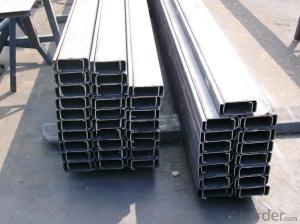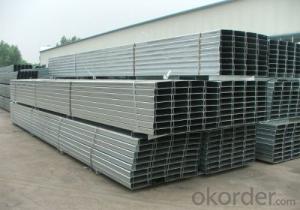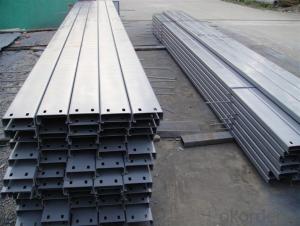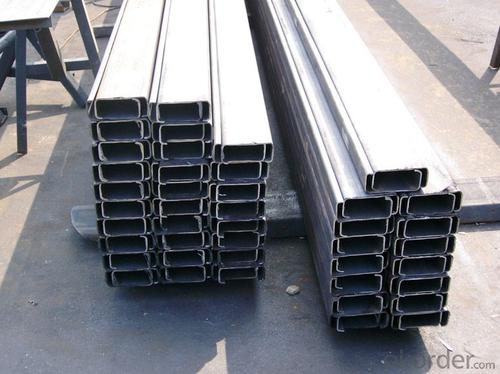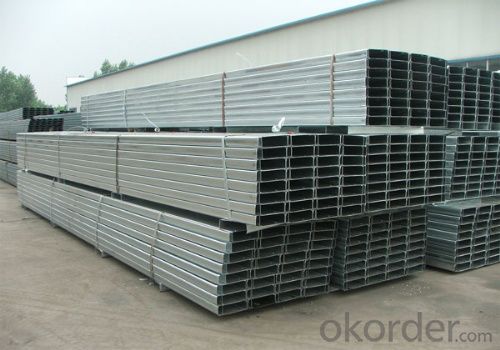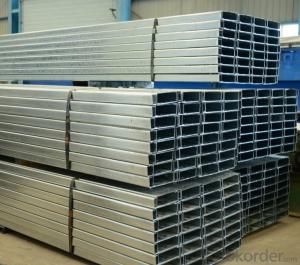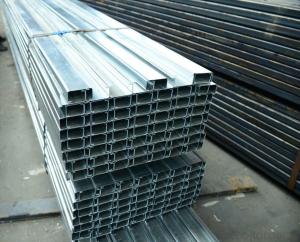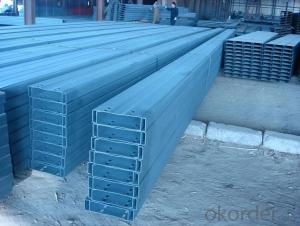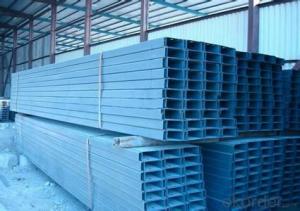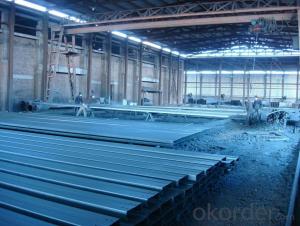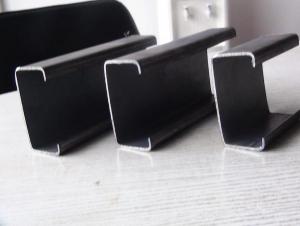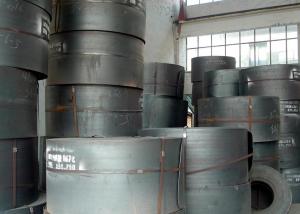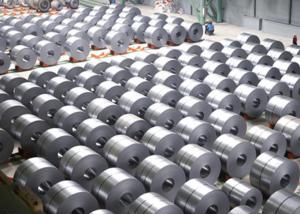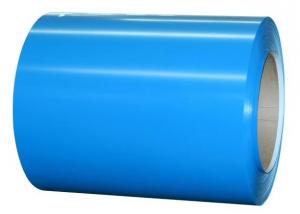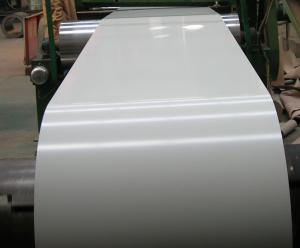Cold Rolled C Channel with High Quality C100/C120
- Loading Port:
- China main port
- Payment Terms:
- TT OR LC
- Min Order Qty:
- 100 m.t
- Supply Capability:
- 15000 m.t/month
OKorder Service Pledge
OKorder Financial Service
You Might Also Like
Specification
Specifications of Cold Rolled C Channel with High Quality C100/C120:
1.Our Cold Rolled C Channel with High Quality C100/C120 has lots of advantages, just as followings:
a) At reasonable price and good quality.
b) To be convenient in construction and to save much time and labor.
c) The length of Cold Rolled C Channel can be manufactured according to customer’s requirements.
d) The Cold Rolled C Channel has strong mechanical strength.
e). The Cold Rolled C Channel possesses various kind of fittings, through which it is suitbal for many combinations.
The detailed sections of Cold Rolled C Channel with High Quality C100/C120 as per GB standard:
| Model | Section size | |||
| h(mm) | b(mm) | a(mm) | s(mm) | |
| C100 | 100 | 40 | 20 | 1.6-3.2 |
| C120 | 120 | 40 | 20 | 1.6-3.2 |
| C120 | 120 | 50 | 20 | 1.6-3.2 |
| C120 | 120 | 60 | 20 | 1.6-3.2 |
The mechanical property of MS Cold Rolled C Channel with High Quality C100/C120 according to Q235B:
Alloy No | Grade | Yielding Strength Point(Mpa) | |||
Thickness(mm) | |||||
≦16 | >16-40 | >40-60 | >60-100 | ||
≧ | |||||
Q235 | B | 235 | 225 | 215 | 205 |
Alloy No | Grade | Tensile Strength(Mpa) | Elongation After Fracture(%) | |||
Thickness(mm) | ||||||
≦16 | >16-40 | >40-60 | >60-100 | |||
≧ | ||||||
G235 | B | 375-500 | 26 | 25 | 24 | 23 |
FAQ:
Q1: Why buy Materials & Equipment from OKorder.com?
A1: All products offered by OKorder.com are carefully selected from China's most reliable manufacturing enterprises. Through its ISO certifications, OKorder.com adheres to the highest standards and a commitment to supply chain safety and customer satisfaction.
Q2: How do we guarantee the quality of our products?
A2: We have established an advanced quality management system which conducts strict quality tests at every step, from raw materials to the final product. At the same time, we provide extensive follow-up service assurances as required.
Q3: How soon can we receive the product after purchase?
A3: Within three days of placing an order, we will arrange production. The shipping date is dependent upon the quatity, how many sizes you want and the plan of production, but is typically 1 month to 2 months from the beginning of production.
Images of Cold Rolled C Channel with High Quality C100/C120:
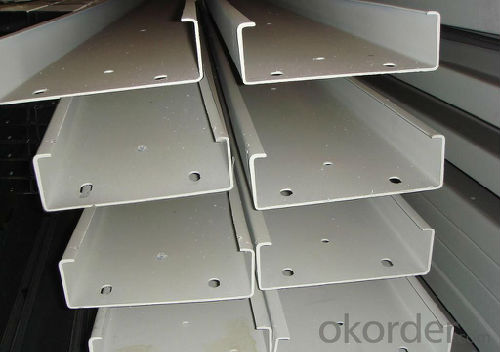
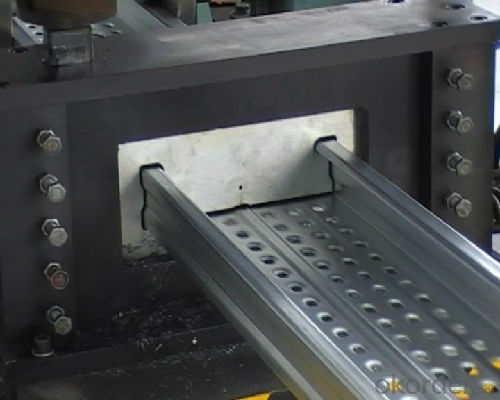
*If you would like to get our price, please inform us the size, standard/material and quantity. Thank you very much for your attention.
- Q: How do steel products contribute to the construction of theaters and concert halls?
- Steel products contribute to the construction of theaters and concert halls in various ways. Firstly, steel is commonly used for the structural framework of these buildings, providing strength, stability, and the ability to span large distances. Additionally, steel is used for roofing, cladding, and facade systems, offering durability and aesthetic appeal. Steel is also utilized in the construction of balconies, stairs, and seating structures, ensuring safety and comfort for the audience. Overall, steel products play a crucial role in creating modern, functional, and visually appealing theaters and concert halls.
- Q: What are the different types of steel pipes and tubes?
- There are several different types of steel pipes and tubes, including seamless pipes, welded pipes, galvanized pipes, stainless steel pipes, and structural tubes.
- Q: How are steel forgings used in the production of mining equipment?
- Steel forgings are commonly used in the production of mining equipment due to their superior strength and durability. They are used to create various components such as gears, shafts, and heavy-duty structural parts that can withstand the harsh conditions and heavy loads encountered in mining operations. The forging process ensures a higher quality and integrity of the steel, making it suitable for withstanding extreme forces and prolonged use in mining equipment.
- Q: What are the common types of steel products used in the pet care and veterinary industry?
- Some common types of steel products used in the pet care and veterinary industry include stainless steel cages, surgical instruments, examination tables, kennels, and various tools and equipment used for animal grooming and handling.
- Q: What is the role of steel in the manufacturing of furniture?
- Steel plays a crucial role in the manufacturing of furniture as it is a strong, durable, and versatile material. It is commonly used to make the frames, legs, and supports of various furniture pieces, providing stability and structural integrity. Additionally, steel can be molded and shaped into different designs, allowing for the creation of sleek and modern furniture styles. Its strength also enables furniture to withstand heavy use and weight, making it suitable for both residential and commercial settings.
- Q: How is steel used in the production of process equipment for chemical plants?
- Steel is commonly used in the production of process equipment for chemical plants due to its exceptional strength, durability, and resistance to corrosion. It is used to construct various components such as storage tanks, pressure vessels, pipes, and heat exchangers, ensuring the safe handling and processing of chemicals. Additionally, steel can withstand high temperatures and pressure, making it suitable for the harsh operating conditions found in chemical plants.
- Q: How does steel pipe coating for marine applications work?
- Steel pipe coating for marine applications works by applying a protective layer of coating to the surface of the steel pipe to prevent corrosion and extend its lifespan. The coating acts as a barrier against harsh marine environments, preventing the pipe from being exposed to corrosive elements such as saltwater and chemicals. This coating can be achieved through various methods such as fusion bonded epoxy (FBE), polyethylene (PE), or polypropylene (PP) coatings. These coatings provide excellent adhesion to the steel surface, ensuring long-term protection against corrosion, abrasion, and mechanical damage. Additionally, the coating also enhances the pipe's resistance to UV radiation and provides insulation against temperature fluctuations.
- Q: What are the different types of steel wires and their applications?
- There are several types of steel wires available, each with its own unique properties and applications. Some common types include carbon steel wire, stainless steel wire, and galvanized steel wire. Carbon steel wire is versatile and used in a wide range of applications such as electrical wiring, fencing, and construction. Stainless steel wire is corrosion-resistant and often used in industries like automotive, aerospace, and medical devices. Galvanized steel wire, coated with a layer of zinc, is commonly used for applications that require strength and durability, such as wire rope, reinforcement in concrete structures, and agricultural fencing.
- Q: What are the different types of steel tanks and their applications in the chemical industry?
- There are several different types of steel tanks commonly used in the chemical industry, each with its own specific applications. Some of the most common types include carbon steel tanks, stainless steel tanks, and alloy steel tanks. Carbon steel tanks are widely used due to their affordability and strength. They are suitable for storing non-corrosive chemicals and are often used for petroleum products, water, and certain acids. Stainless steel tanks are known for their superior corrosion resistance and durability. They are commonly used for storing corrosive chemicals, such as acids, alkalis, and solvents. These tanks are also suitable for hygienic applications in the food and pharmaceutical industries. Alloy steel tanks are designed to withstand high pressures and temperatures. They are often used for storing reactive chemicals, such as hydrogen, ammonia, and chlorine. These tanks are also used in processes that require high strength and resistance to corrosion. Overall, the choice of steel tank in the chemical industry depends on the specific application, the properties of the chemicals being stored, and the required levels of corrosion resistance, strength, and durability.
- Q: What is the role of steel in the infrastructure development?
- The role of steel in infrastructure development is crucial as it provides strength, durability, and flexibility to various structures such as bridges, buildings, and highways. Steel's high tensile strength allows for the construction of taller and larger structures, ensuring their stability and safety. Additionally, steel is resistant to corrosion, making it suitable for withstanding harsh weather conditions and extending the lifespan of infrastructure. Its versatility and recyclability also contribute to cost-effectiveness and sustainability in construction projects. Overall, steel plays a vital role in the development of resilient and long-lasting infrastructure.
Send your message to us
Cold Rolled C Channel with High Quality C100/C120
- Loading Port:
- China main port
- Payment Terms:
- TT OR LC
- Min Order Qty:
- 100 m.t
- Supply Capability:
- 15000 m.t/month
OKorder Service Pledge
OKorder Financial Service
Similar products
Hot products
Hot Searches
Related keywords
